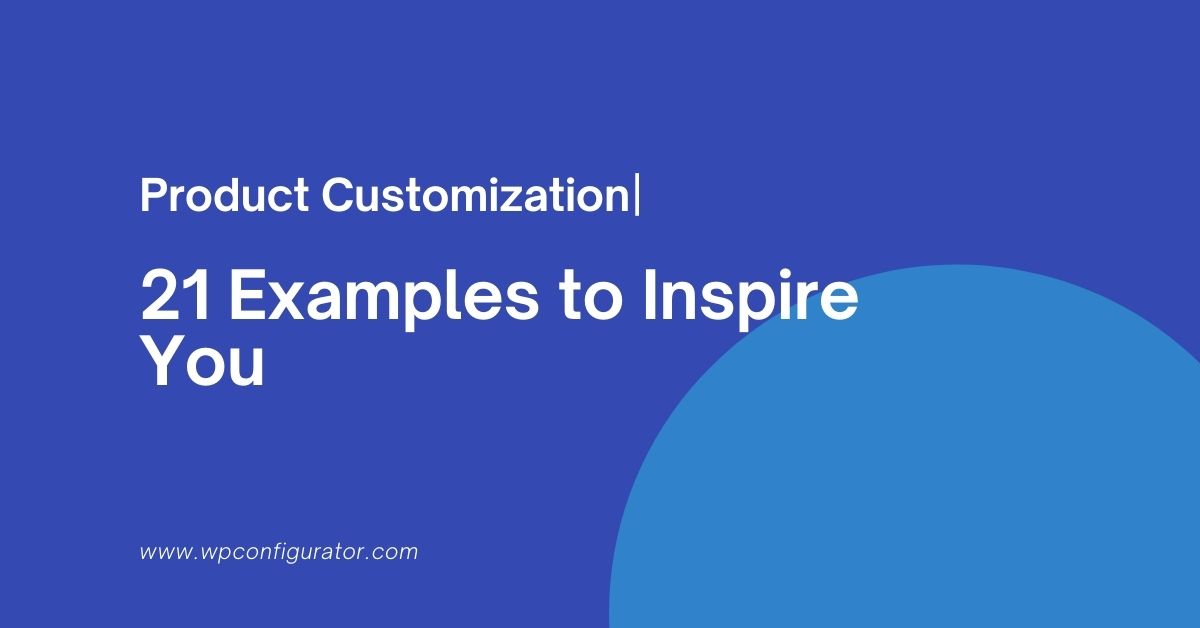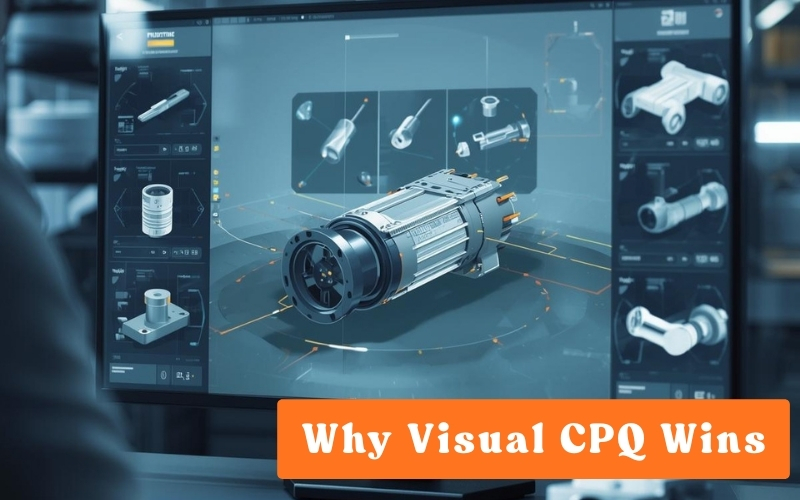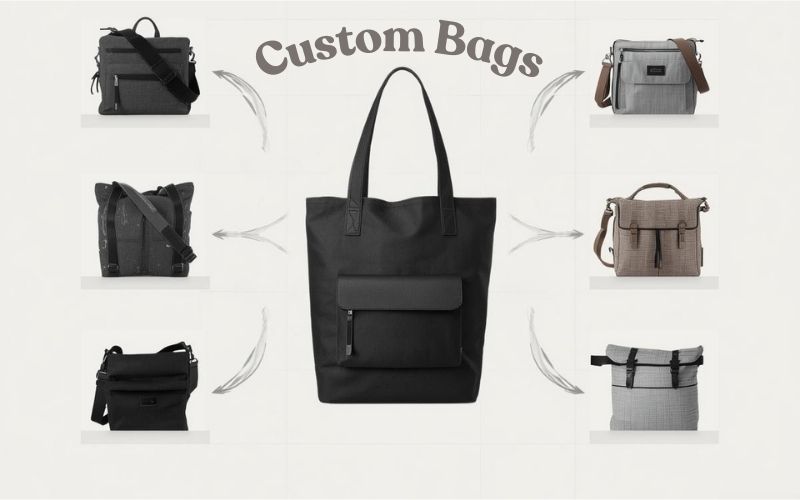In today’s digital age, the e-commerce landscape is more competitive than ever. One way brands are standing out is by offering product customization options. This allows customers to tailor products to their specific needs and preferences, enhancing their overall shopping experience. But what exactly is product customization, and why is it so valuable for businesses? In this guide, we’ll dive into the concept of product customization, explore its benefits, and provide 20 examples of customizable products across different industries.
What Is Product Customization?
Product customization is the process of modifying or personalizing a product according to a customer’s preferences. This can range from aesthetic changes like color and design to functional modifications such as features and configurations. Ultimately, the goal is to deliver a product tailored to individual needs, enhancing the customer’s satisfaction and connection with the brand.
In simpler terms, customization allows consumers to play a role in the creation of the product, offering them a chance to co-create something that speaks directly to their needs. The practice is becoming more widespread, particularly in e-commerce, where brands are offering user-friendly customization tools.
Why Product Customization Matters
Customization offers a unique selling point for businesses, creating more value for the customer and fostering stronger brand loyalty. In fact, a study by Accenture found that 75% of consumers are more likely to purchase from retailers that offer personalization. Customization also allows businesses to reduce stock costs, as products are often made on demand, cutting down on excess inventory and waste.
The Rise of Customizable Products in E-commerce
As e-commerce continues to grow, product customization is becoming a key differentiator for many online stores. Offering personalized products not only boosts customer satisfaction but also increases sales. Many consumers are even willing to pay more for customization options, particularly in industries like fashion, electronics, and home decor. A recent survey revealed that 81% of consumers would pay more for customized clothing, with similar figures across other product categories.
Read our Blog here : Visual Product Configurator
Benefits of Product Customization
Let’s take a deeper look at the advantages that product customization can offer your business.
1. Increased Customer Satisfaction
One of the main reasons companies are offering customization is that it improves customer satisfaction. People are more likely to be satisfied with a product that’s tailored to their preferences and needs, and happy customers are more likely to make repeat purchases.
2. Enhanced Brand Loyalty
Customization also helps build long-term relationships with customers. When a brand allows shoppers to personalize their purchases, it creates a unique experience, fostering stronger emotional connections with the product and the company behind it.
3.Boost in Sales and Revenue
Product customization can lead to increased sales as customers are more likely to purchase something they had a hand in creating. Personalized products often command higher prices, giving businesses the opportunity to generate more revenue per sale.
4. Reduced Inventory Costs
Since customizable products are typically made on demand, companies can reduce inventory costs. Instead of stockpiling numerous variations of a product, businesses can offer one customizable template that customers modify to their liking, streamlining the manufacturing process.
5.Better Insights Into Customer Preferences
When customers personalize products, they are essentially telling you what they want. This data provides valuable insights that businesses can use to develop new products or improve existing ones.
6. Eco-Friendly Practices
Customization can contribute to sustainability efforts. Products are typically made-to-order, reducing overproduction and waste. This also cuts down on storage costs and the energy required for producing and storing unsold items.
Read our blog about GLTF
Types of Product Customization
Product customization can come in many forms, ranging from aesthetic choices to functional modifications. Here are some common types of customization available today:
1. Aesthetic Customization
This allows customers to modify the look and feel of a product, such as selecting colors, designs, or materials. Aesthetic customization is often used in fashion, home decor, and electronic accessories.
2. Functional Customization
Functional customization involves altering the way a product works or performs. For example, customers might be able to choose the storage capacity or screen size of an electronic device, or configure kitchen cabinets based on their specific space requirements.
3. Personalized Text and Images
Allowing customers to add custom text or upload images to a product is a popular form of customization. It’s often seen in industries like apparel, phone cases, and promotional items.
4. Component Customization
Some products can be broken down into components that customers can mix and match. This is common in industries like automotive, electronics, and furniture, where buyers may want to select different features, accessories, or configurations.
Read Our Page Here : Woocommerce Product Configurator
Product Customization Software : How to implement in e-commerce store?
One of the easiest ways to integrate product customization into your e-commerce product configurator business is by using WP Configurator. This powerful tool enables store owners to offer customized products without any need for complex coding or technical expertise. Designed to be user-friendly and flexible, WP product Configurator helps you deliver an engaging and interactive shopping experience for your customers, allowing them to personalize products in real-time.
With WP Configurator, you can offer endless customization options, from choosing colors, adding custom text, or even uploading images. The platform is equipped with live product previews, so customers can see their design choices instantly, ensuring they get exactly what they want. Here are some key features of WP Configurator:
- Custom Text & Image Upload: Customers can personalize products by adding their own text or uploading logos and images, ideal for businesses offering custom apparel, accessories, or home decor.
- Conditional Logic: Tailor the customization options based on customer selections, ensuring a smooth and intuitive experience.
- 3D Visualizations: Enhance your store with immersive 3D product views, giving customers a clear and realistic representation of their custom designs.
- Responsive Design: WP Configurator is fully mobile-friendly, allowing customers to customize products seamlessly on any device.
- Real-time Pricing: Dynamic pricing updates automatically as customers make changes to their product, ensuring complete transparency.
Whether you’re looking to offer customizable shoes, clothing, furniture, or electronics, WP Configurator is the perfect solution to transform your e-commerce store and increase sales.
21 Best Examples of Product Customization
Here’s a closer look at 21 customizable products, spanning different industries. These examples show how businesses are leveraging product personalization to offer something unique to their customers.
Shoes

- Nike: Offers a “Nike By You” option where customers can design their own shoes, choosing colors, materials, and even adding custom text.
- Vandel: Allows customers to customize every part of their shoes, from the sole to the laces.
Jewelry
- Gemvara: Allows customers to design their own rings, necklaces, and other jewelry, choosing metals, stones, and engravings.
- Alfe Bijoux: Specializes in personalized jewelry where customers can select their preferred materials and engrave special messages.
Jackets
- First Manufacturing Co: Offers customizable leather jackets, where customers can choose from various colors, styles, and accessories.
- Hockerty: Lets customers personalize their jackets by selecting fabrics, fits, and additional features.
Glasses

- Oakley: Offers customizable sunglasses, allowing users to pick frame colors, lens tints, and engrave personal messages.
- Hall of Frame: Offers custom Cartier glasses where you can choose lenses, colors, and materials.
Phone Accessories

- Dodocase: Allows customers to design custom phone cases by uploading images and selecting colors and materials.
- Casetify: Provides personalization options for phone cases with text, colors, and uploaded graphics.
Food
- Mymuesli: Lets customers create their own muesli mix by selecting ingredients like oats, fruits, and nuts.
- M&M’s: Offers personalized M&M’s, where customers can choose colors and print custom messages or images.
Sporting Goods

- MRP: Offers customizable sporting gear, from jerseys to equipment.
- Superare: Lets athletes personalize their gear, including gloves, pads, and apparel.
Bags
- Timbuk2: Allows users to design their own bags, choosing fabrics, colors, and accessories.
- Purse For The People: Offers handmade custom purses where buyers can select the style, material, and accessories.
Automotive

- Porsche: Offers a customization program where buyers can select everything from the interior trim to performance upgrades.
- Yamaha: Provides options to personalize motorcycles with custom parts and accessories.
Electronics

- Scuf Gaming: Lets gamers design custom controllers by selecting colors, buttons, and features.
- Cinch Gaming: Offers fully customizable gaming controllers, allowing users to choose colors, grips, and additional features.
Clothing
- Levi’s: Offers customization options for their iconic denim products, allowing customers to personalize their jeans and jackets by selecting the fit, fabric, washes, and adding custom embroidery or patches.
Getting Started With Product Customization
Incorporating customization into your e-commerce business is more straightforward than ever, thanks to modern tools and plugins. At WP Configurator, we offer a range of solutions designed to help businesses deliver personalized products to their customers.
Our Customization Solutions:
- Plugin WP Configurator Pro: A versatile tool that allows you to integrate full product customization into your WordPress site.
- ADDON Conditional Logic: Lets you offer tailored customization options based on customer inputs.
- ADDON Custom Text & Image Upload: Perfect for businesses offering text and image personalization for products like apparel or accessories.
- Premium Skin Panorama Pro: Enhance your customers’ experience with 3D visualizations, giving them a more immersive shopping experience.
Conclusion
Product customization is an excellent way for businesses to create a unique shopping experience while boosting customer satisfaction, brand loyalty, and sales. As the demand for personalized products grows, offering customization is no longer a luxury—it’s a necessity. Whether you’re selling shoes, jewelry, electronics, or even food, giving your customers the power to create something unique can be the key to standing out in a crowded marketplace.
Ready to take your e-commerce to the next level with product customization? Explore our WP Configurator solutions and start offering personalized products your customers will love.
Frequently Asked Questions
WP Configurator Plugin





